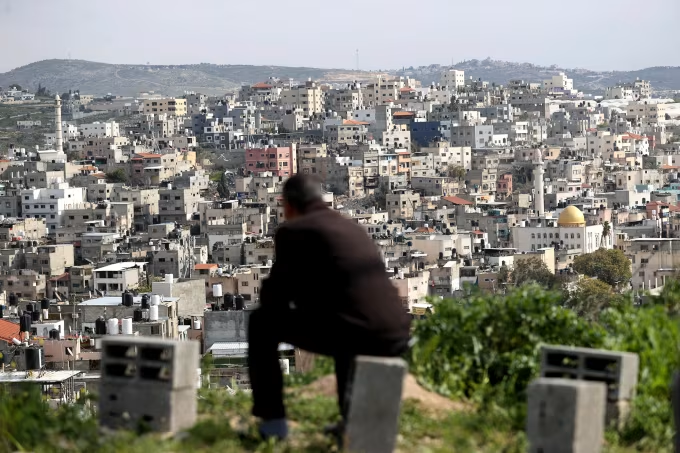Israel is weighing the annexation of parts of the occupied West Bank, three Israeli officials told CNN, as several Western nations move toward recognizing Palestinian statehood this month.
The move is being considered in retaliation for anticipated recognition by France, Australia, Canada, Portugal, and the United Kingdom, joining more than 140 countries that already recognize a Palestinian state.
Late Monday, Belgium’s Deputy Prime Minister Maxime Prevot announced plans to recognize Palestine at the UN General Assembly, saying Belgium had a “duty to prevent any risk of genocide.”
He added, however, that recognition would only occur “once the last hostage has been released and Hamas no longer governs Palestine.”
Prevot also announced targeted sanctions, including a ban on imports from Israeli settlements in the West Bank.
Israeli Prime Minister, Benjamin Netanyahu, discussed annexation of parts of the West Bank last week, but the security cabinet has not yet deliberated in detail, and no decision has been made, officials said on condition of anonymity.
Israel captured the West Bank from Jordan in 1967 and began establishing Jewish settlements there soon after, in defiance of international law.
Palestinians seek the West Bank, East Jerusalem, and Gaza Strip for a future state, a position supported by most of the international community.
Netanyahu is considering various annexation options, from limited takeover of certain Jewish settlements to broader moves covering Area C, which comprises 60% of the West Bank.
The Oslo Accords of the 1990s divided the West Bank into Areas A, B, and C, with Area C fully under Israeli control.
Israeli Foreign Minister, Gideon Saar, briefed US Secretary of State Marco Rubio on the plans last week, though other Israeli sources told CNN the proposals have not received US approval.
A US State Department spokesperson declined to discuss details of interagency or diplomatic discussions.
One key option under consideration is annexing the Jordan Valley, a strip along the eastern West Bank near the Jordan River. Officials said there is broader Israeli public support for this proposal, which could be framed as a security measure to make it more acceptable internationally and to Washington.
However, Netanyahu’s far-right allies, ministers Bezalel Smotrich and Itamar Ben Gvir, along with settler leaders, oppose partial annexation.
They favour a maximalist approach, applying sovereignty over all territory not inhabited by Palestinians. This would encircle Palestinian population centers, further challenging the creation of a contiguous Palestinian state.
Applying sovereignty over areas with Palestinian inhabitants could require granting citizenship or residency to roughly 3 million Palestinians in the West Bank. Annexation would violate multiple UN Security Council resolutions and provoke major diplomatic backlash. Israeli settlements are considered illegal under international law, reinforced by UN Security Council resolution 2334 in 2016, which labeled them a “flagrant violation” with “no legal validity.”
Omer Rahamim, CEO of the Yesha Council representing West Bank settlers, told CNN that annexation should be “a preemptive move ahead of the French recognition of Palestinian statehood. By applying sovereignty, we will prevent the establishment of a Palestinian state, because it is impossible to establish a state on the sovereign territory of another country.” Rahamim said the settler leadership demands broad annexation, arguing that limiting sovereignty to certain settlements would leave the rest “another Gaza in the heart of the country.”
Given anticipated political and international pressure, Netanyahu is considering a phased approach, starting with selected territory toward broader sovereignty. This strategy could allow Israel to retreat from full annexation in exchange for normalization with Saudi Arabia.
In 2020, Netanyahu abandoned annexation plans as part of the Abraham Accords, which normalized relations with the UAE, Bahrain, and Morocco. Saudi Arabia has insisted that no normalization will occur without a pathway to Palestinian statehood.
Alongside annexation, Israel is exploring punitive measures in response to Palestinian statehood recognition, including sanctioning the Palestinian Authority or evacuating the village of Khan Al-Ahmar.
The US recently denied visas to Palestinian Authority officials for this month’s UN General Assembly, where French President Emmanuel Macron is expected to announce France’s recognition of Palestinian statehood.
An Israeli official said the US decision was coordinated with Israel to prevent Palestinian Authority President Mahmoud Abbas from attending.
Despite strong US support for Israel under President Donald Trump, some of Washington’s closest allies are alarmed by Netanyahu’s government and conduct of the war.
Trump acknowledged, “They’re gonna have to get that war over with. But it is hurting Israel. There’s no question about it. They may be winning the war, but they’re not winning the world of public relations, you know, and it is hurting them.”
